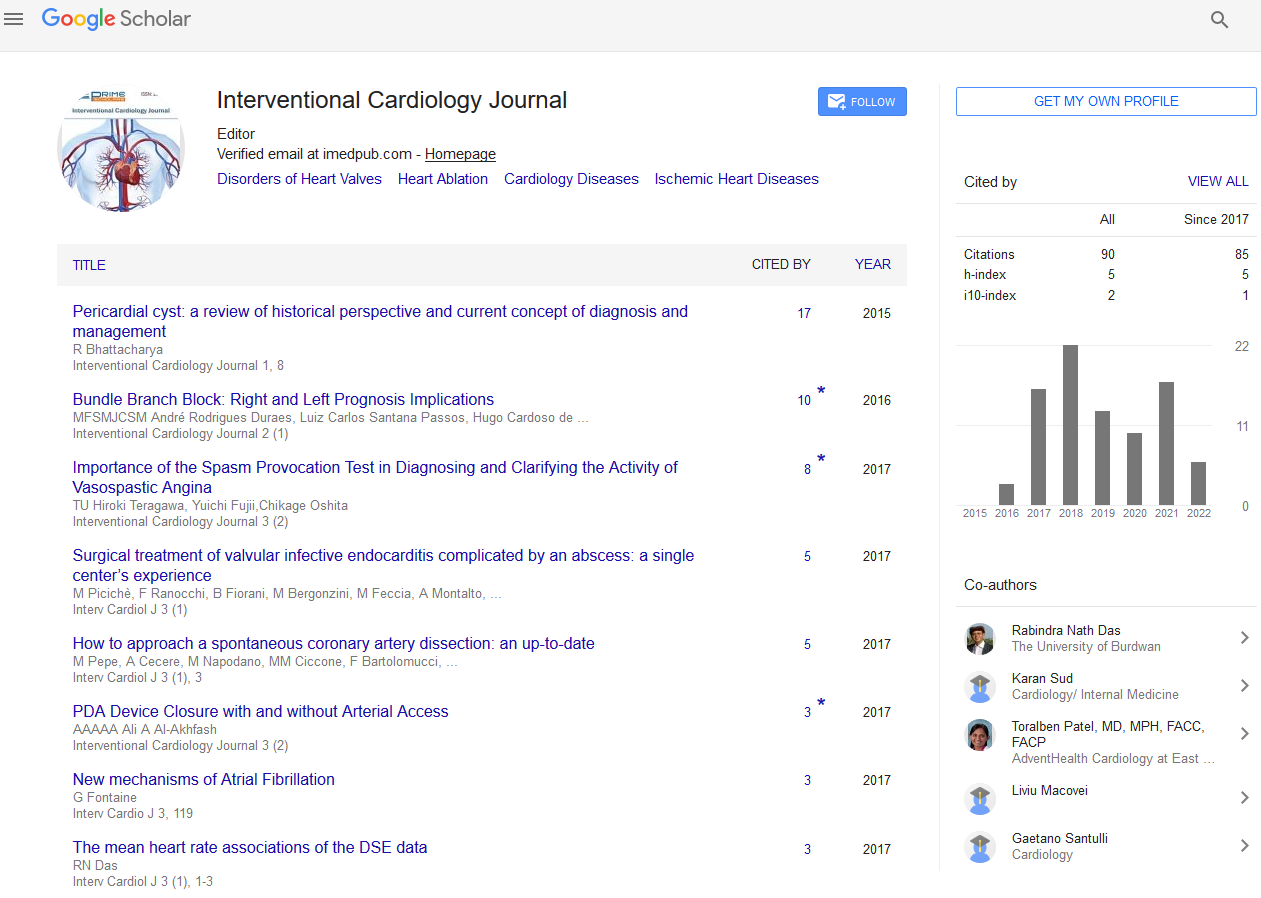Commentary - (2024) Volume 10, Issue 1
Stem Cell Therapy in Cardiovascular Diseases: A Promising Frontier in Regenerative Medicine
Peter Kelvenskie*
Department of Medicine, University of Miami, USA
*Correspondence:
Peter Kelvenskie,
Department of Medicine, University of Miami,
USA,
Email:
Received: 01-Jan-2024, Manuscript No. IPIC-23-18962;
Editor assigned: 03-Jan-2024, Pre QC No. IPIC-23-18962 (PQ);
Reviewed: 17-Jan-2024, QC No. IPIC-23-18962;
Revised: 22-Jan-2024, Manuscript No. IPIC-23-18962 (R);
Published:
29-Jan-2024, DOI: 10.21767/2471-8157.10.01.06
Description
Cardiovascular Diseases (CVDs) continue to be a leading cause
of global morbidity and mortality, prompting researchers to explore
innovative therapeutic approaches. Among these, stem
cell therapy has emerged as a promising avenue, holding the
potential to regenerate damaged cardiac tissue and improve
heart function. This article provides a comprehensive overview
of stem cell therapy in cardiovascular diseases, including the
types of stem cells used, mechanisms of action, current clinical
applications, challenges, and future directions. Stem cells are
undifferentiated cells with the unique ability to differentiate
into various cell types and self-renew. In the context of cardiovascular
therapy, two main types of stem cells are commonly
investigated: Embryonic Stem Cells (ESCs) and adult or somatic
stem cells. ESCs are derived from the inner cell mass of embryos,
while adult stem cells can be found in various tissues, such
as the bone marrow, adipose tissue, and the heart itself. Induced
Pluripotent Stem Cells (iPSCs) represent another category,
generated by reprogramming adult cells to exhibit embryonic
stem cell-like properties. One of the key mechanisms of stem
cell therapy in cardiovascular diseases involves the differentiation
of stem cells into functional cardiomyocytes. These newly
formed heart cells integrate into damaged tissue, contributing
to the regeneration of healthy myocardium. Stem cells also exert
their therapeutic effects through paracrine signaling, where
they release various growth factors, cytokines, and extracellular
vesicles. These bioactive molecules promote tissue repair,
angiogenesis, and anti-inflammatory responses, fostering a
conducive environment for cardiac regeneration. Ischemic
heart diseases, particularly Myocardial Infarction (MI), result
from inadequate blood supply to the heart muscle. Stem cell
therapy has shown promise in this context by enhancing myocardial
regeneration, reducing scar formation, and improving
overall cardiac function. Stem cells contribute to the formation
of new blood vessels, a process known as angiogenesis. This
is especially beneficial in ischemic conditions where improved
blood supply can salvage damaged tissue and promote functional
recovery. Over the past two decades, numerous clinical
trials have been conducted to assess the safety and efficacy
of stem cell therapy in cardiovascular diseases. Early trials focused
on establishing the feasibility of using various stem cell
types, such as bone marrow-derived cells, for myocardial repair.
Recent advancements include trials exploring the use of
iPSCs, cardiac progenitor cells, and Mesenchymal Stem Cells
(MSCs). These trials aim to address specific challenges, such
as improving engraftment, optimizing delivery methods, and
enhancing the durability of therapeutic effects. One significant
challenge in stem cell therapy for cardiovascular diseases is
achieving robust engraftment and long-term survival of transplanted
cells. Strategies to enhance cell survival and retention
within the heart are actively being investigated. The immune
response poses another challenge, particularly in allogeneic
stem cell transplantation. Strategies to mitigate immunogenicity,
such as using autologous cells or immunomodulatory approaches,
are crucial for the success of stem cell therapies. The
standardization of stem cell isolation, expansion, and delivery
protocols is essential for ensuring reproducibility and comparability
across different studies. This standardization is crucial
for regulatory approval and widespread clinical implementation.
Advancements in genome editing technologies, such as
CRISPR-Cas9, offer the potential to enhance the therapeutic
properties of stem cells. Precision editing can be employed to
improve their engraftment, survival, and secretion of beneficial
paracrine factors.
Acknowledgement
None.
Conflict Of Interest
The author’s declared that they have no conflict of interest.
Citation: Kelvenskie P (2024) Stem Cell Therapy in Cardiovascular Diseases: A Promising Frontier in Regenerative Medicine. Interv Cardiol J. 10:06.
Copyright: © 2024 Kelvenskie P. This is an open-access article distributed under the terms of the Creative Commons Attribution License, which permits unrestricted use, distribution, and reproduction in any medium, provided the original author and source are credited.

